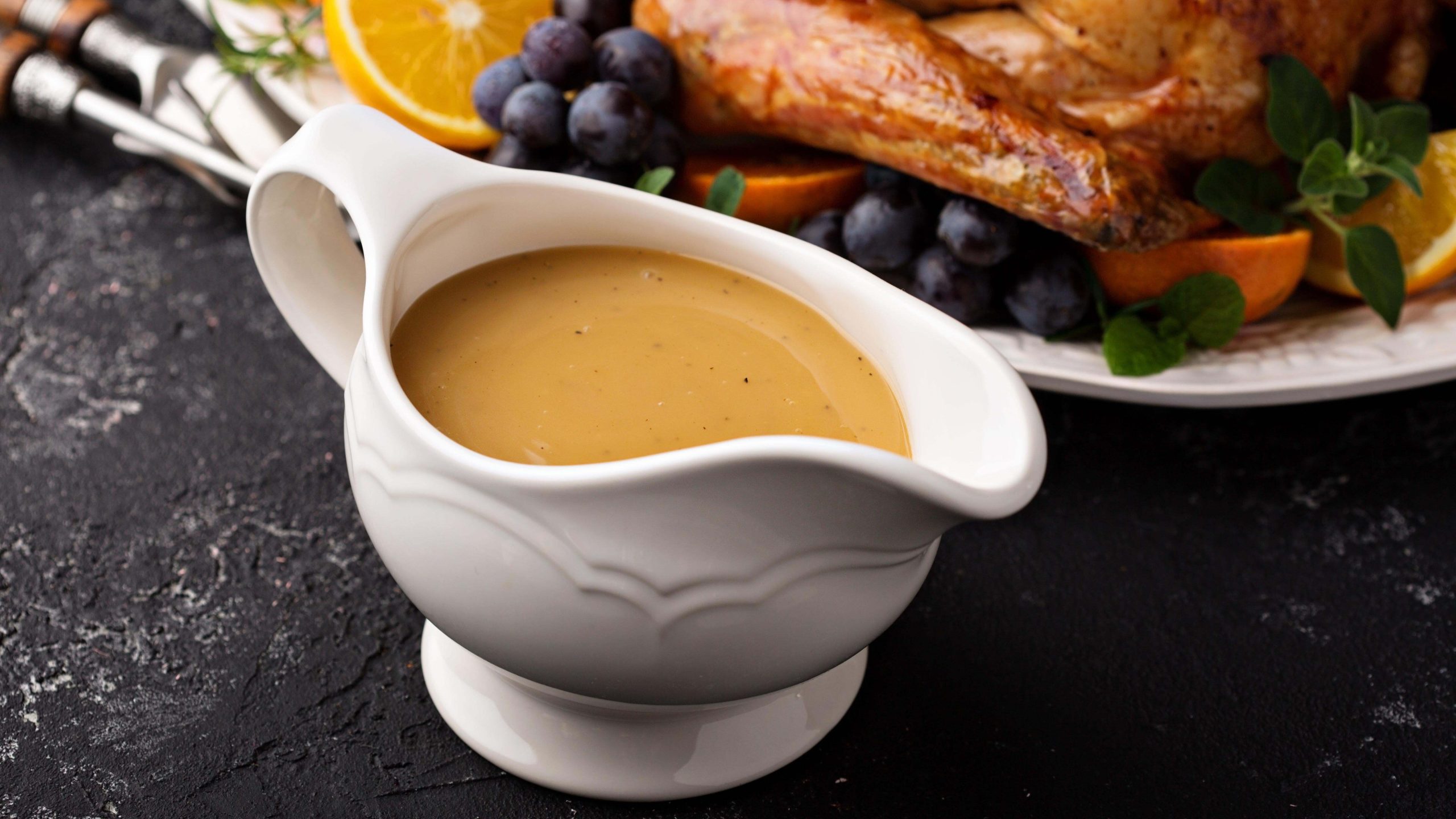Thanksgiving gravy is a must-have on the feast table. This delectable and versatile sauce elevates everything it touches on the plate, and reflects the savory flavors of the perfectly roasted turkey that just made its debut on the table. Obviously, that means you’ll be using the fresh pan drippings, right? As if the host wasn’t frantic enough with cooking, reheating, plating, and serving; Now they have to make a last minute gravy. Pass. You can save yourself trouble and still get that rich turkey flavor by freezing your gravy now and adding pan drippings later.
How to freeze gravy
First, make the most delicious complete gravy. Make a roux, however toasted and dark you like, and whisk in enough broth to get a consistency that’s a bit thicker than you’d usually make it. This accounts for the turkey drippings that will thin it out on the big day. Season the gravy, and allow it to cool to room temperature, or even chill it down in the fridge. Pour the cool gravy into a freezer-safe zip-top bag. Flatten or squeeze all the air out and freeze it flat, or with a pencil to portion it. Lay it flat in the freezer, or in the shape you want, and let if freeze solid.
Note that white gravy (made with the addition of milk or cream) can, sadly, break when thawing. If you’re making a gravy with milk or cream, I’ll point you to this post for freezing a roux base of butter and flour in advance. At least you can still be a step ahead.
How do you thaw frozen gravy?
On Thanksgiving Day, break apart the frozen gravy (you can defrost it slightly by putting the bag in a bowl of warm water), add it to a pot, and reheat it over low heat. Whisk it smooth. Store the warm gravy in an insulated bottle to keep it hot all day. When the bird finally comes out of the oven, your gravy is ready and waiting for concentrated turkey juice. Pour the drippings into a measuring cup and skim off the fat, or use this handy trick to defat the drippings. Pour the gravy out of the bottle and into a pot. (You can keep the container handy, it’ll be used again shortly.) Gradually whisk in the turkey drippings. When you’re happy with the thickness, stop pouring. Add freshly chopped herbs or bits of turkey meat if you like. Taste the gravy and season it if needed. Pour the gravy back into the insulated bottle to serve.
This trick isn’t limited to Thanksgiving either. You can freeze any homemade brown gravy, like chicken gravy, beef gravy, vegetable or mushroom gravy, and add drippings or fresh herbs on the day that you want to use it. It also works in the reverse scenario—you’ve made way more fresh gravy than you needed, just freeze the leftovers for another day.
Freezable Make-Ahead Gravy Recipe
Ingredients:
4 tablespoons butter
4 tablespoons all-purpose flour
1 ¾ cups of turkey stock or broth
1 teaspoon of beef boullion base
⅛ teaspoon onion powder
1 teaspoon soy sauce
Pinch MSG
2 or 3 grinds of fresh black pepper
½ cup to 1 cup defatted turkey drippings (stir in after reheating)
1. In a large measuring cup, add the turkey stock and the beef bouillon base. Microwave the liquid until it’s steaming, about two minutes. Stir to dissolve the bouillon.
2. In a medium pot, cook the butter and flour over medium-low heat. Whisk them together until they make a smooth paste, and cook it for one to five minutes, or until the mixture becomes golden brown and smells toasty.
3. Slowly add the hot liquid in four installments, whisking constantly. Whisk the mixture smooth before adding the next amount of liquid. Once all of the broth is in the gravy, turn off the heat, and stir in the onion powder, MSG, soy sauce, and black pepper. Allow the gravy to cool to room temperature.
4. Pour the cooled gravy into a freezer-safe zip-top bag. Freeze it flat.
5. When needed, take the gravy out of the freezer. You can thaw it slightly by leaving it on the counter for 30 minutes, or putting the bag in a bowl of warm water. Break the gravy into pieces and add it to a pot. Reheat the gravy over low heat. When you can, whisking frequently to break it up and smooth it out. Whisk in as much of the turkey drippings as you need to thin out the gravy to a consistency you like. Taste, and season further if needed.
